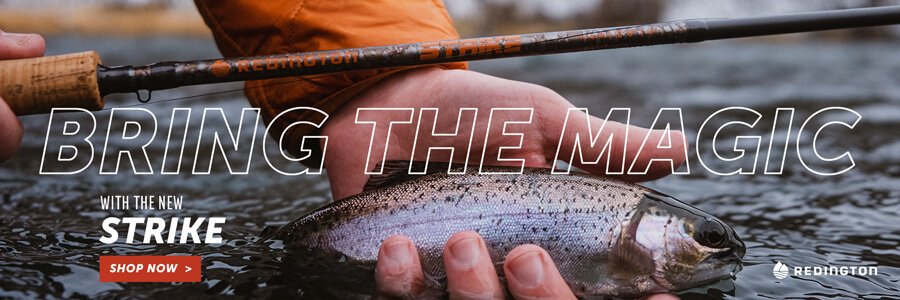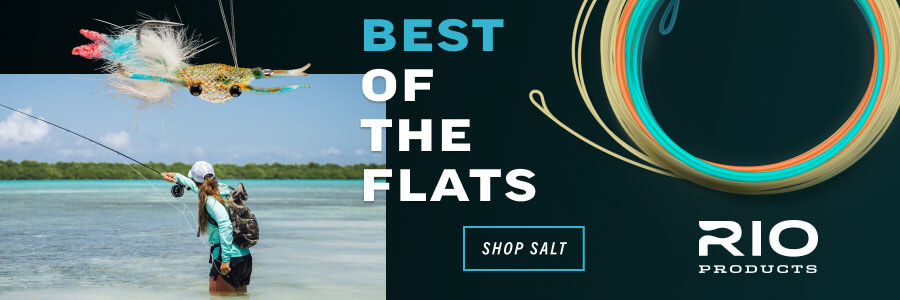Janus' Game: the two faces of fly fishing
Janus, the two-faced Roman god of duality, may as well be the god of fly fishing, too. As the god of contradictions, fly fishing deserves to fall squarely under his purview. The month of January is even named for Janus, which is fitting because perhaps there is no more incongruous fishing during the year than what we are presented with in this, the dead of winter. Fly fishing is rife with contradictions. So much about the pursuit we love is in direct opposition to itself. In the present day, fly fishing is often viewed as a conservation-minded endeavor though at its most basic roots, it is a means of harvest and a “blood sport.” Consider that even the most zealous supporters of catch and release fishing use flies tied with the skins, furs and feathers of animals not so lucky as to be released. No matter the care and effort taken by catch and release fishermen to ensure the health of their targets, it is impossible to guarantee that all of the fish they hoped not to kill will survive. The dichotomies associated with fly fishing run so deep as to be completely inseparable. Few if any familiar with the sport would say that fly fishing is the easiest way to catch a fish. What is it then about the added complications inherent to our chosen method that draws people into a more difficult way to catch fish?
So much about what makes fly fishing oxymoronic is in the context of the individual angler’s quarry. When most people consider fishing they expect that the angler will pursue and attempt to catch the largest possible fish. While that is true for many, consider the small wild and native trout of the meandering high altitude creeks. These diminutive fish are targeted the world over not due to their size, eating qualities, or robust fighting skills, but instead for something more. The intangibles. Ponder the reason that so many fishermen would spend the time, energy, money, blood, sweat and tears to catch a fish that would seem at place in a home aquarium. The pursuit is the primary motivation for many anglers. The catch itself, secondary. Within most every angler is conceivably the desire to catch the biggest, baddest fish around. I am absolutely at ease with myself when backpacking and carrying my one weight rod in search of native southern Appalachian brook trout, but my pulse also races while hunting down striped bass in the reservoirs of my north Georgia home. I attempt these two things in the same sport with outwardly similar tackle and often even on the same day. There is little to no correlation between the effort and money I expend and the size of the fish I catch. Explaining this to an outsider can be nearly impossible. How could these two incomparable fish achieve parity to an angler while for all of human history the larger fish would be the far more valuable one? This train of thought has been hammered into our genome for time immemorial as survival is what dictated our pursuit. Even today our society is infamous for its ‘bigger is better’ ethos. Why then, does fly fishing culture so frequently break from countless years of precedent and even from modern social norms?
I often spend more effort catching smaller fish, and shockingly to some, this is intentional in some ways. I fly fish for the peace and serenity it helps me attain as much for the achievement I feel while chasing big fish. So, here in the dead of a north Georgia winter I have two primary fly fishing options that most appeal to me and that are in direct contrast to each other; the small stream wild trout that rarely measure more than eight inches long, or the aggressive striped bass that average eight pounds. To fish in the high altitude rhododendron with the slight warmth of the weak winter sun or to launch the skiff at night on a glassy reservoir? Beautiful, parr-marked rainbows and brookies or linesiders with powerful broom tails? Every day invokes this question and every winter day elicits a different answer.
As the days grew shorter and colder in our area, so too did some of the fishing grow hotter and more explosive. These are the two faces of January as I find them. As night fishing for striped bass reaches its peak during the winter and early spring, I still surprisingly find myself just as often opting for the greater difficulty and ostensibly diminished success found while fishing for wild trout. Not long ago I discovered that I generally fish with two distinctly different attitudes and purposes, either searching for a kind of inner peace or conversely for some form of outward achievement. The intimate nature of a trout stream is typically where I find the former whereas the latter often comes on bigger water and in pursuit of typically larger fish. While it’s true that it is terrifically fun to catch big fish with a fly rod, I have learned that in my personal experience, I split my time somewhere down in the middle in choosing which form I prefer my efforts to take on a given day. It may seem odd, but my click-and-pawl one weight reel feels just as exciting to me as my nine weight rod outfitted with a stiff backbone and heavy tippet. The slashing attack of a tiny brook trout is no less impressive to me than the comparatively massive striper engulfing baitfish. With the stressors of our modern world, I can always find a respite in the solitude of the mountains. With personal and societal pressures for achievement, I also crave the capture of big fish to prove my success.
I recently went whitewater rafting with a new friend from Lithuania. He’s substantially older than me and comes from a generation and culture with priorities different than my own. Between wild runs of whitewater on our recent excursion down the Nantahala, he inquired into my passion for guiding people in fly fishing. He asked all of the “typical” questions about where we fish, what we fish for and all thereof. After some contemplation he said, “I just don’t get it. How someone could pay you to take them fishing only to release the fish back to the water, it’s beyond me.” Right there is one of the greatest ironies of fly fishing. For thousands or maybe tens of thousands of years, we as a species have hunted and fished in order to survive. It’s only in the last half a century that the idea of pursuing and then releasing a potential food source has entered the zeitgeist. Catch and release is not the forgone conclusion that many in the fly fishing community take it to be. I relished the opportunity to share my feelings regarding fly fishing to a neophyte, so I dove in with my friend explaining, “Fly fishing is about so much more than the act of fishing. Is it the easiest way to catch a fish? No. Is it the most efficient way to catch a fish? Absolutely not! But the reason we do it is because it connects us with nature. So, it’s clearly not about the fish themselves or what calories they can provide us. Look at where we are right now,” I exclaimed, gesturing to the steep walls of the Nantahala River Gorge. “If we wanted the most convenient and efficient way to travel, we wouldn’t be barreling down this whitewater river either. We are here for the experience, for the pursuit of adventure and to establish a deeper connection with nature. The journey on the river and the act of fly fishing are very similar, they should be a reward in and of themselves.”How is that for irony? That the main goal of fishing is, at least sometimes, something other than catching fish.
I believe that for nearly all people, water holds a certain pathway into the soul. For countless generations, our species has been completely and inseparably dependent on water. Both in its innate life-giving properties as well as for the opportunities it has provided us. Now, there are even studies that effectively describe the demonstrable mental and physical health benefits of being beside large bodies of water. I believe that this obvious pull to our collective unconscious is a manifestation of our eons of dependence on water and all that comes with it. Why do we fly fish? Sometimes it may be as simple as the desire to be near the water. The urge to be standing in the stream as the current tugs at our legs or the skiff breaks the light chop beneath us. The atavistic call of water speaks to all of us if we only pay the slightest attention and the two faces of fly fishing provide the watery lens by which myself and others view our natural world.



